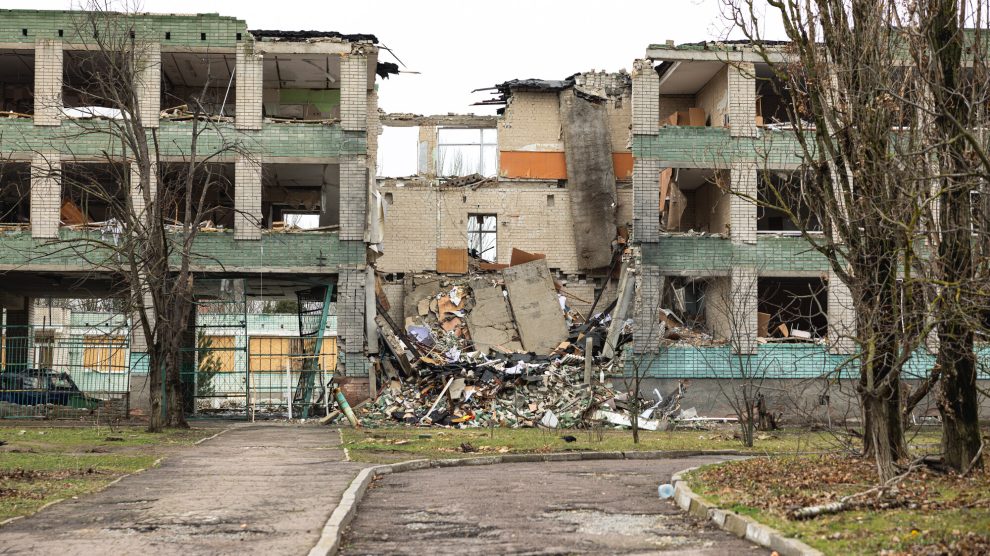As of October 2024, an estimated 3.6 million people remain internally displaced in Ukraine, while the United Nations estimates that Ukraine has lost 60 per cent of its electricity-generating capacity.
A thousand days of war in Ukraine has driven millions to the edge. As the third winter takes hold, civilian homes and infrastructure, aid workers and ambulances, are all being targeted.
Fear, exhaustion, and indiscriminate violence are devastating lives in Ukraine, warned Norwegian Refugee Council (NRC) Secretary General Jan Egeland this week on a visit to the country.
“The civilian population is being terrorised by a relentless, daily volley of Russian drones and missiles. People I have met this week in Kherson and Odessa are under constant attack. They must increasingly flee into bomb shelters, sometimes multiple times per day. Many are cold this winter, and all speak of exhaustion and fear,” said Egeland.
- Ukraine’s economy, like its people, resists
- Russia’s key naval base in the Med is lost: A significant strategic defeat
- E-government: Catching up with the Baltics
According to the International Organisation for Migration (IOM), As of October 2024, an estimated 3.6 million people remain internally displaced in Ukraine.
Efforts to support the population with humanitarian aid are increasingly challenged by the level of insecurity and regular bombardments, meaning that many of the most vulnerable risk being cut off from a vital lifeline.
“I saw in Kherson drones flying over the city continuously, leaving both residents and humanitarian workers in a state of constant fear and tension. Since the start of the year, over 50 aid workers have been killed or injured in Ukraine, the majority in or around Kherson. It is utterly unacceptable that aid should be prevented from reaching those in need,” added Egeland.
Since mid-July, Kherson and neighbouring villages have been subjected to more than 9,500 attacks with small drones, killing at least 37 people and injuring hundreds more.
Humanitarians targeted
The attacks have also often directly struck humanitarian activities and personnel. In recent weeks, a humanitarian distribution centre was hit, which resulted in casualties amongst the aid workers and civilians present there.
“Increasing attacks are creating terrible consequences for the communities I have met this week. In recent months, the number of civilian casualties has reached the highest level since October 2022. Millions of families have been driven from their homes, deprived of their livelihoods, as the struggle for daily life and safety has eclipsed everything else. Many have lost their supplies of water, food, and heating in the midst of this cold winter,” Egeland said.
Many families are increasingly unable to keep lights or heating on in their homes as a result of devastating airstrikes. Deliberate attacks on energy infrastructure, a crime under international law, are creating impossible conditions for the elderly, the disabled, and families with children.
As a result of the targeted attacks, Ukraine has lost 60 per cent of its electricity-generating capacity. Recently, massive country-wide Russian strikes left over one million Ukrainians without electricity. The loss of energy has also cut off essential water supplies as well as access to heating, at a time when temperatures are below freezing.
Nowhere left to turn
As access to humanitarian aid continues to be restricted by the attacks, displaced people and local communities increasingly have nowhere left to turn. In Kherson, 70 per cent of the most vulnerable people have no savings left, raising difficult questions on how they can continue to survive.
“Right now, people in Kherson, as well as in other parts of Ukraine, are facing impossible choices. They can try their luck at aid distribution sites, which are being increasingly targeted by drone attacks, or cope as best they can on their own,” said Egeland.
“Almost half the people we are supporting here have told us that in order to survive they are cutting down on healthcare and heating expenses, while increasingly accumulating debt with their families and their neighbours. We need to be able to provide them with the assistance that they need.
“This week I have witnessed the effects of a modern military machine being directed at civilian areas and infrastructure. It is paramount that the population is protected, and that we are able to reach those in need. All parties to the conflict must urgently de-escalate the war and ensure that humanitarians can deliver assistance in a safe and secure environment.”
Photo: A secondary school in Kherson destroyed by a 400kg Russian glide bomb in the autumn. Ed Prior/NRC.
If you would like to further discuss the current situation in Ukraine, and what it means for business and investment, get in touch.

